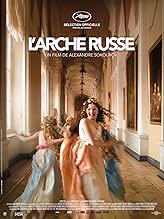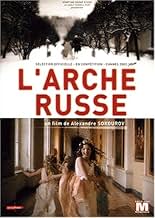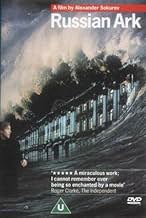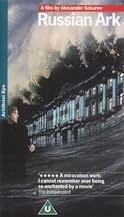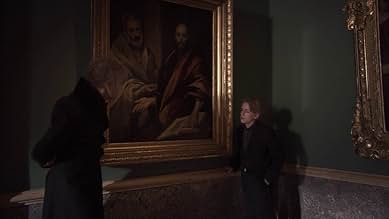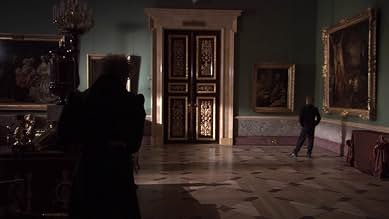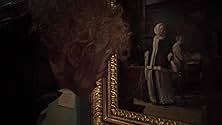Un aristocratico francese del 19° secolo, noto per i suoi testi sulla vita in Russia, attraversa il museo dell'Ermitage di San Pietroburgo e incontra personaggi storici degli ultimi 200 anni... Leggi tuttoUn aristocratico francese del 19° secolo, noto per i suoi testi sulla vita in Russia, attraversa il museo dell'Ermitage di San Pietroburgo e incontra personaggi storici degli ultimi 200 anni.Un aristocratico francese del 19° secolo, noto per i suoi testi sulla vita in Russia, attraversa il museo dell'Ermitage di San Pietroburgo e incontra personaggi storici degli ultimi 200 anni.
- Regia
- Sceneggiatura
- Star
- Premi
- 10 vittorie e 15 candidature totali
Recensioni in evidenza
I was drawn to this film as I have recently had to install digital television in my house (just for 24!) and I figured that I might as well see what the channels had to offer. After working out that I had access to numerous shopping channels I also found that I had BBC4, the arts and history channel, and that it was to be showing this film. I was interested in it not for my love of Russian history but for the fact that it was done in one take and, for that reason, I quite enjoyed it.
As far as plot goes, I really think you need to have an existing knowledge of Russian history as this film will not help you understand anything about it other than a passing impression. This was the case for me as I know next to nothing of the history, but I was still able to gleam some things about the political relationships between Russia and Europe as well as some of the main players. However it never got to the point where I was taken or engaged by the material; interested is perhaps a more fitting word to use - and that's still a good thing.
Technically the film is gripping and very impressive. Much was made of Snake Eye's 20 minute one-take opening (even thought it was actually 3 takes) or Goodfella's seamless move from street to table, but this film blows them away. I cannot even imagine the sheer logistics involved in creating such an effect. It would be impressive if the film was all shot in one room with a few cast members, but this film moves around the museum with a cast of thousands and set pieces that vary from two people looking at paintings to a massive ballroom scene. I was held totally impressed by the whole film as the entire one take was delivered seamlessly, without flaw. For this reason the acting is impressive whether it is Dontsov's acerbic Frenchman or just some extra's - everyone had to get it right bang on time and they did.
Overall this film will be a masterpiece if you have a good working knowledge and understanding of Russian history. However even if you don't know that much (like me), the technical aspect of this film will impress you no end even if the material is best seen as `interesting' at best.
It would have been enough that the director got extensive access to the Hermitage Museum in Petersburg to show it to us.
It would have been enough to have authentic costumes, choreography, and make-up for several centuries of Russian history. (I was reminded that my husband's grandmother was a young seamstress for rich folks like these, making this extravagant lifestyle possible.)
It would have been enough to have literally a cast of thousands because how else can one really know how those fantastic ballrooms and grand staircases were meant to be used and seen without a full orchestra and gowned and uniformed participants as far as the camera can see?
It would have been enough to come up with a cute gimmick of a time-traveling two-some to glide us through the rooms of the Hermitage to show the tsars, aristocrats, curators, and ordinary Russian tourists who have passed through over the years, with humorous commentary on Russia's changing relationship with Europe over these centuries as shown through the art and architecture of the building while wars and revolutions loomed outside.
But then, it would have been enough that it's all done in a single take over just an hour and a half with luscious cinematography.
There was a slow line to get in the theater so I missed the opening historical background, and I've learned most of my Russian (let alone European) history from novels and movies so I did get a bit lost here and there wandering the corridors of history, but the unseen narrator posits that this is all a dreamscape anyway.
I made a point of seeing this because a fellow cinephile who I frequently bump into at my local arthouse had directly called the distributor asking when it would be playing elsewhere and was told they can't afford to make more prints available so one can only see it at the Manhattan theaters -- so make a point to see it on a movie screen and not just wait for when the History Channel shows a reduced version.
For their bravura, awe-inspiring cinematic tour-de-force, director Alexander Sokurov and cinematographer Tilman Buttner take us into the famed Hermitage Museum and Winter Palace in St. Petersburg, providing us with a grand tour not only of the opulent rooms and famous artwork contained therein, but of 300 years of Russian history as well, as various vignettes involving famous people (from Peter and Catherine the Great to Nicholas and Alexandra) and events are played out within the glorious gilded walls.
`Russian Ark' is a bold and audacious project that is the cinematic equivalent of a breathlessly performed high wire juggling act. We know that one false move on the part of the actors or the cameraman, one missed cue or accident of fate could bring the whole delicately poised enterprise crashing down around them. How often, one wonders, did a perfectionist like Sukorov have to resist the temptation to yell `Cut!' to his actors and crew? It's truly amazing to see just how beautifully planned and flawlessly executed the final product turns out to be, especially the ball sequence at the end which features hundreds of dancers and spectators who are set in beautifully choreographed and constantly whirling motion. What's most remarkable is how much of a participant the camera itself is in the proceedings. Not content to stand idly by and observe the scene like some passive onlooker, the camera moves right into the center of the action, gliding in and out of the crowds with utmost grace and precision. Visually, the film is stunning, with exquisite costumes and furnishings as far as the eye can see. Indeed, `Russian Ark' is, among other things, a veritable feast for the eyes, the likes of which we have rarely seen on film before.
`Russian Ark' does have something of a `plot,' involving a narrator whom we never see, a 21st Century filmmaker we assume it's Sukorov himself - who's found himself inexplicably caught in some type of time warp and magically transported to this strange spectral world. There's also a bizarre European `ghost' figure from the unspecified past who comments - and occasionally attempts to intrude on the actions taking place around him. But these two characters are of far less interest to the audience than the aural and visual delights of the film itself.
`Russian Ark' is a wonder to behold, for it is much more than just an `exercise,' a `gimmick,' or even an `antithesis' to Eisenstein; it is a vibrant work of art that challenges the limits of its medium and reminds us of just what it is about movies that we love so much.
The film begins in the dark with the narrator (apparently Sokurov) commenting about how little he sees. "My eyes are open", he says, "and yet I see nothing". He does not know where he is but apparently has just died in an accident of some kind. Is this a movie? A play?" he asks. He receives no answer except a vision of 18th century aristocrats moving slowly into the Tsar's palace. An elegant white-haired man in a black cloak (Sergey Dreiden) suddenly appears and escorts the confused narrator into the corridors of the grand palace. "Everyone knows the present, but who can remember the past", says the stranger as they walk from one ballroom to the next, witnessing great works of art as well as ghost-like presences from Russia's past. We see works by El Greco, Rubens and Van Dyck in their awesome splendor. We run into Peter the Great thrashing a general, Catherine the Great looking for the bathroom, and Nicholas II, the last Russian Tsar hosting the Great Royal Ball of 1913, the last such formal occasion of its kind.
As we enter the Great Nicholas Hall, the opulent room is filled with thousands of aristocrats dancing the mazurka in gorgeous period costumes. A full orchestra is playing in the background and young soldiers are nattily dressed in their uniforms. How beautiful it all seems and how it appears they were destined to live forever but we all know how the nasty Bolsheviki spoiled the party. Ah yes, how green was my valley then. Sokurov said he wanted to make a whole film "in one breath" and he has succeeded in simulating the breathing process, pulling us in, then moving us out as we feel the rhythm of our own life beating with the swirl of lost humanity. At the end of Russian Ark, we see the peaceful flow of a river outside the hall to which the narrator comments, "The flow is forever. Life is forever." Having completed the past, our invisible guide is now ready to move into the endless silence that is, in the phrase of the Anglican priest Thomas Kelly, "the source of all sound".
Lo sapevi?
- QuizShot in a single take. The first three attempts were cut short by technical difficulties, but the fourth was successful.
- BlooperMany extras look to the camera and they quickly return to a default mark.
- Citazioni
The Time Traveller: Sir. Sir. A pity you're not here with me. You would understand everything. Look. The sea is all around. And we are destined to sail forever, to live forever.
- ConnessioniEdited into Spisok korabley (2008)
- Colonne sonoreMazurka
(from opera "A Life For The Tsar")
Music by Mikhail Glinka
Performed by Mariinsky Theatre Orchestra
Conducted by Valery Gergiev
I più visti
- How long is Russian Ark?Powered by Alexa
Dettagli
- Data di uscita
- Paesi di origine
- Lingue
- Celebre anche come
- Russian Ark
- Luoghi delle riprese
- Aziende produttrici
- Vedi altri crediti dell’azienda su IMDbPro
Botteghino
- Lordo Stati Uniti e Canada
- 3.048.997 USD
- Fine settimana di apertura Stati Uniti e Canada
- 29.022 USD
- 15 dic 2002
- Lordo in tutto il mondo
- 8.691.860 USD
- Tempo di esecuzione
- 1h 39min(99 min)
- Colore
- Mix di suoni
- Proporzioni
- 1.78 : 1






